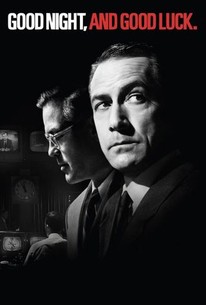Final Post
What Is the Transhistoric Relationship Between the Press and the Government in a Society Aspiring to Democracy?
Good Night, and Good Luck film by George Clooney
Brief Summary:
In 1946, a former aircraft crewman during World War II is elected to represent Wisconsin in the United States Senate. Notably, his methods would become infamous in American history, known today as
Quick notes on the film:
- It details how the most respected journalist in America in 1954—Edward R. Murrow—and CBS producer Fred Friendly created a series of episodes of Murrow’s popular show See it Now that exposed many Americans to McCarthy's deceptive, dishonest, and bullying tactics
-McCarthy was able to embody such an influence because most Americans only saw his side of the story
-The film embodies the ideas of free media to promote truth, provoke criticism and discussion, and educate the public.
- Even though Murrow was not the first journalist to take on McCarthy, the popularity of his show symbolized and foreshadowed the fall of McCarthy's career as his lies begin to engulf him
-The film dramatizes this historical and pivotal moment in journalism and politics
Major Themes / Takeaways:
*McCarthyism:
The era of the "red scare" was propelled by Senator Joseph McCarthy. He created a culture of fear which spread across the nation by instituting Communism through such a degree of aggression that people started to judge and mistrust any person thought to pledge allegiance to Communism. The editorial tactic
*Media Responsibility:
Media responsibility is the biggest element of this movie. It is used to introduce and conclude the film through Murrow speaking before a group of television and radio executives who were there to honor him at a dinner. He saw television for what it could be as it could be used as a powerful device to educate American people and provide tools that would be beneficial to them. Instead, this ideology is contrasted by television to profit and make money, divert, entertain, and delude. Through his eyes, the programs that do well on TV are those that make individuals feel good and allow them to escape the realism of the pain they endure in everyday life.
-How Murrow shows this:
-The participation in more diversional programming through interviewing rich and famous individuals on the show
-He does this to open the opportunity to participate in "real journalism" in his other episodes
-He strikes a deal with the CBS head that entails he will get to participate in real news if he agrees to do some not so important or “fluff” pieces that advertisers would invest largely in
-He does not censor his words; he firmly believes that the mishandling of power via TV is a large threat to personal freedom and education which portrays the major theme of Murrow's judgment that new journalism has a large responsibility to its viewers through a political and intellectual sense versus simply keeping people "entertained".
Consider This:
This movie portrays a transhistorical period, defined as a trait or quality that is not limited to one historical period but, instead, cuts across all periods. Do we simply watch TV to be informed or entertained? What side of the TV is being portrayed to us and what don't we know? Politics can and is used every day as a weapon of fear in which Americans feel as if their voice is limited to despite the first amendment which is ironic to the cardinal rule in which the government gets its power only through the consent of the governed- a perpetual but quite broken cycle at times. The film also exemplifies
the ironic parallel of the sixth clause of the first amendment
As seen in the movie portrayed through McCarthyism, the chilling effect, defined: In a legal context, a chilling effect is the inhibition or discouragement of the legitimate exercise of natural and legal rights by the threat of legal sanction- similar to the red scare, the period after 9/11 when the US launched a "global war on terror" in which people were petrified and scared what to believe following the devastating event. In context most recently, I immediately think of Trump's presidential term in which many people feared the outcomes of his behavior, use of media, and unprofessionalism.
Personal Response:
I believe this film did a great job of portraying such an uncertain time considering politics, media, and society. It reminded me of just how real and disturbing the red scare was. It's so ironic to me that even
though the constitution and its embodiments have set a template for America’s political and governmental system, so much of it was and is still ignored today. Good Night, and Good Luck is such an interesting film that can be interpreted subjectively but my main takeaway from it was that media and communication have always been around and is essential in enforcing the ways people feel. It is a powerful tool to society and can change things in an instant whether we use it appropriately or not, not just through politics either.
Sources:
https://www.history.com/topics/cold-war/red-scare
https://www.gradesaver.com/good-night-and-good-luck/study-guide/themes







Comments
Post a Comment